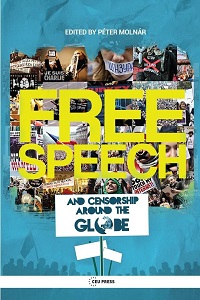
We kindly inform you that, as long as the subject affiliation of our 300.000+ articles is in progress, you might get unsufficient or no results on your third level or second level search. In this case, please broaden your search criteria.


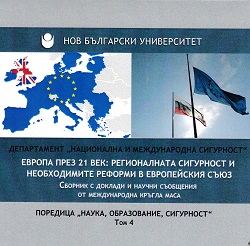
"Border environment" is characterized by control of national states on their own territory, also by “separateness and otherness, i.e. to be culturally different from the core of the majority of the population"; areas of regional and international conflicts, but also of adapting trough their cultural heterogeneity and their role as areas of migration. Besides being barriers, boundaries can be characterized with the metaphor of the "bridge" that connects and enables the passage of people and their connectivity, incentives on trade and flow of goods. 467 The text is based on field research along the Bulgarian-Greek border in the regions of Zlatograd and Gotse Delchev. The following issues are addressed: the state borders of Bulgaria and Greece as a means to control the territories and people during the socialist period; the reasons for the treatment of Bulgarian Muslims as a threat to the national security of both Bulgaria and Greece during the period 1944-1989; changes in the functioning of borders and perception of border areas rather as a bridge of economic and cultural exchange during post-socialism; border as a bridge space of economic and cultural exchanges beyond 2010.
More...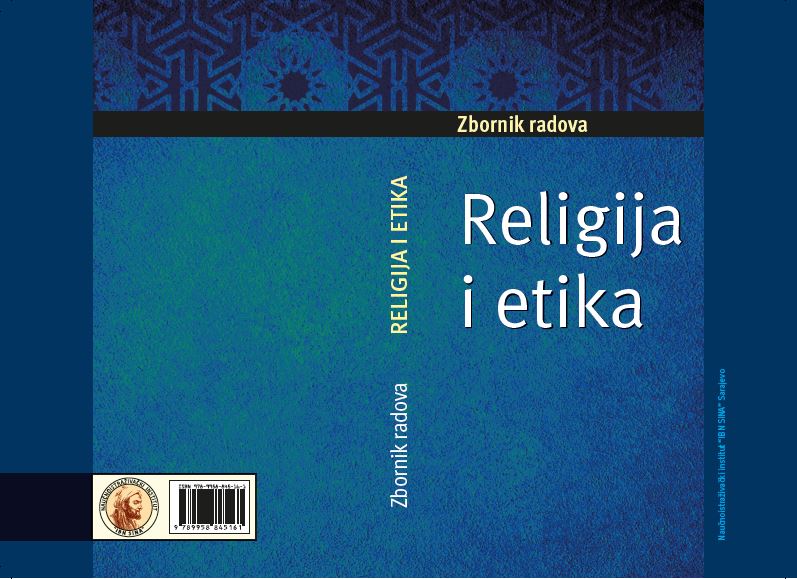
Tekst predstavlja svojevrsni presjek predavanja profesora Morteze Motahharija u vezi s islamskom etikom i poimanjem morala u islamu. Budući da je praktično riječ o nizu predavanja sačuvanih uglavnom na magnetofonskim vrpcama i kasnije redigiranim za štampu, pokušali smo nekoliko takvih kazivanja uvezati u jednu smisaonu cjelinu.
More...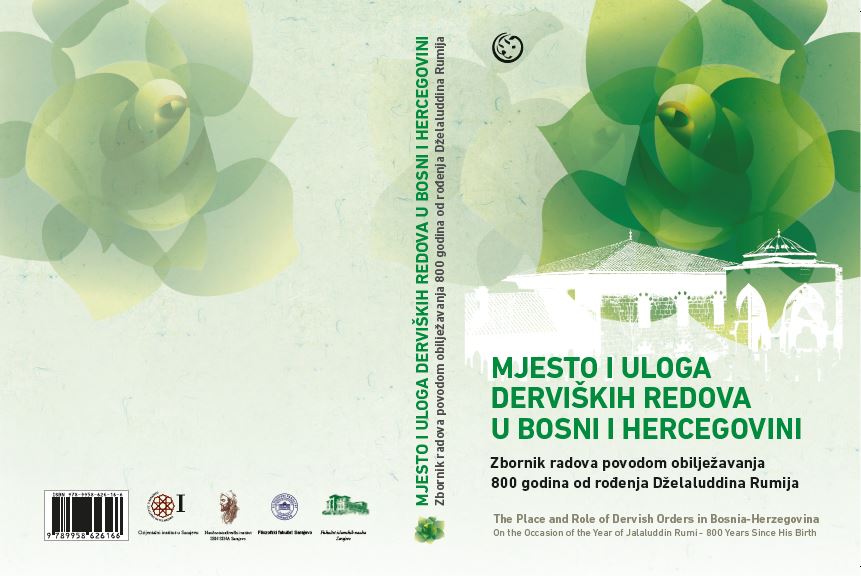
In this paper, the focus is on two issues: the question of Mevlana’s ancestry and the task of Iranians in presenting Mevlana’s literary heritage in the world. On the basis of a quotation from the work Manāqebol-‘ārefīnby Aflāki, prof. Džalālī in an argumentative manner writes about Mevlana’s Khorasanian ancestry, and he further supports his argument by the fact tha tall Mevlana’s works were written in Persian. On the other hand, by gradual introduction into the world of Mevlana’s poetry, professor shows that, although Mevlana’s thought was shaped by the culture of Khorasanian mental and intellectual mind-set, his world reaches all the way to the homeland of his soul, which is the Najistan for whom the naj weeps so painfully. Iranian cultural workers have a task to show that Mevlana is a descendant of Iranian civilization and rich cultural heritage in Persian by argumentative and academic promotion of Mevlana’s spiritual heritage.
More...
The theme of this work relates to certain parts of Ibn ‘Arabi’s treatise Rūhal-Quds. Those parts which express his observation and critical judgment of certain models of behavior and actions of individuals in Sufi circles are singled out. The main characteristic of the emphasized parts is its simplicity,but also the directness of the expression. Ibn ‘Arabi’s Treatise was written in the beginning of 13th century in Mecca.
More...
During his journey to hajj in 1969, Fejzulah Efendija Hadžibajrić obtained,in his words ‘’an honorary mavlavi tarikat’’ while on the way tohajj – during his meeting with Husayn-efendi Holat, a vakil of the shaykhof mavlavi tarikat. This event stands apart from shaykh certificate for kaderitarikat which he received in Konja while on his way back to Sarajevo.Right after receiving the honorary mavlavi tarikat, in resplendent Medina,in Haremi-Šerif, he took an oath at Mavlavi shaykh hadži Fehmi-Efendi Konjali. Apart from these, Fejzulah-Efendija obtained permission foriršad for Rufai, Nakshibandi, Shadhili and Badawi tarikat.
More...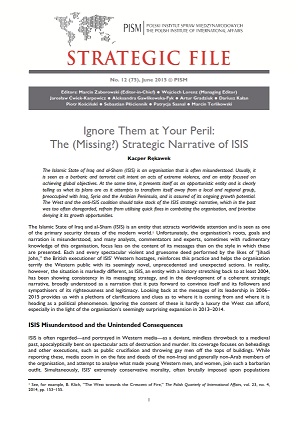
The Islamic State of Iraq and al-Sham (ISIS) is an organisation that is often misunderstood. Usually, it is seen as a barbaric and terrorist cult intent on acts of extreme violence, and an entity focused on achieving global objectives. At the same time, it presents itself as an opportunistic entity and is clearly telling us what its plans are as it attempts to transform itself away from a local and regional group, preoccupied with Iraq, Syria and the Arabian Peninsula, and is assured of its ongoing growth potential. The West and the anti-ISIS coalition should take stock of the ISIS strategic narrative, which in the past was too often disregarded, refrain from utilising quick fixes in combating the organisation, and prioritise denying it its growth opportunities.
More...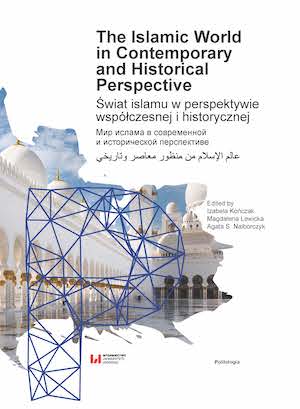








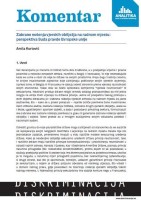
Već decenijama je marama ili hidžab tema šire društvene, a u posljednje vrijeme i pravne polemike u nekoliko evropskih država, naročito u Belgiji i Francuskoj. To nije iznenađujuće kada se uzme u obzir da obje te države na svojim prostorima imaju dugu tradiciju islama, te brojne muslimanske zajednice koje zahtijevaju poštivanje svojih vjerskih uvjerenja. Uprkos tome, ni Belgija ni Francuska ne djeluju odveć otvorene prema vjerskoj raznolikosti svojih stanovnika. Takav stav se često opravdava zahtjevima “vjerske neutralnosti” ili sekularizma. Neutralni pristup države religiji između ostalog podrazumijeva da niti jedna religija ne smije imati utjecaja na državna pitanja. Jedna od posljedica takvog pristupa u ovim dvjema državama je i zabrana nošenja vjerskih simbola na radnom mjestu za javne službenike, što – kako se u praksi pokazalo – najviše dotiče pokrivene žene muslimanke. Osim državne službe, zabrane nošenja hidžaba, odnosno drugih vjerskih obilježja, uvele su i škole, ugostiteljski i sportski objekti, a sada i poslodavci privatnog sektora, formulirajući ove zabrane kao zabrane nošenja pokrivala za glavu ili generalne zabrane nošenja vjerskih obilježja i odjeće. Takve prakse su u mnogim slučajevima svojim odlukama podržali i nacionalni sudovi.
More...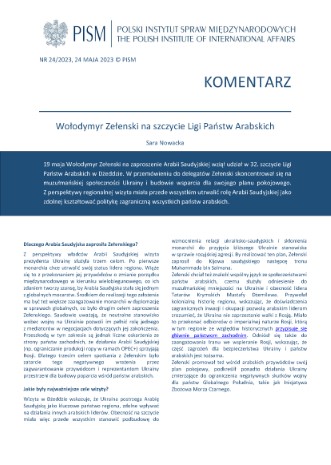
19 maja Wołodymyr Zełenski na zaproszenie Arabii Saudyjskiej wziął udział w 32. szczycie Ligi Państw Arabskich w Dżeddzie. W przemówieniu do delegatów Zełenski skoncentrował się na muzułmańskiej społeczności Ukrainy i budowie wsparcia dla swojego planu pokojowego. Z perspektywy regionalnej wizyta miała przede wszystkim utrwalić rolę Arabii Saudyjskiej jako zdolnej kształtować politykę zagraniczną wszystkich państw arabskich.
More...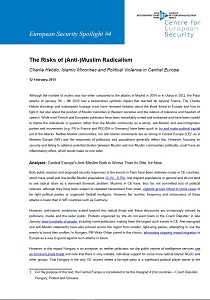
Although the number of victims was low when compared to the attacks in Madrid in 2004 or in Utøya in 2011, the Paris attacks of January 7th – 9th 2015 had a tremendous symbolic impact that reached far beyond France. The Charlie Hebdo shootings and subsequent hostage crisis have renewed debates about the jihadi threat to Europe and how to fight it, but also about the position of Muslim minorities in Western societies and the relation of tolerance and freedom of speech. While most French and European politicians have been remarkably united and restrained and have been careful to blame the individuals in question rather than the Muslim community as a whole, anti-Muslim and anti-immigration parties and movements (e.g. FN in France and PEGIDA in Germany) have been quick to try and make political capital out of the attacks. Neither Muslim communities, nor anti-Islamic movements are as strong in Central Europe (CE)1 as in Western Europe (WE) and the responses of politicians and populations generally reflect this. However, focusing on security and failing to address potential divides between Muslim and non-Muslim communities politically, could have an inflammatory effect, which would make no one safer.
More...